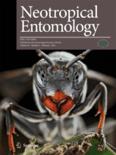
NEOTROPICAL ENTOMOLOGY
Scope & Guideline
Advancing Insect Science in the Tropics
Introduction
Aims and Scopes
- Insect Taxonomy and Systematics:
The journal publishes significant taxonomic studies, including the description of new species and revisions of existing genera, particularly focusing on Neotropical insects. - Ecology and Biodiversity:
Research on the ecological roles of insects, their interactions with other organisms, and their contributions to biodiversity in various ecosystems, including urban and anthropogenic environments. - Pest Management and Biological Control:
A strong emphasis on studies related to pest management strategies, including the use of biological control agents, the impact of chemicals, and the assessment of pest populations. - Conservation and Environmental Impact:
Papers addressing the conservation of insect species and their habitats, as well as the impacts of climate change and human activities on insect populations and biodiversity. - Behavioral Studies:
Research on the behavior of insects, including mating, foraging, and predation, providing insights into their ecological roles and adaptations. - Physiological and Molecular Studies:
Studies exploring the physiological responses of insects to environmental changes, including stress factors and their molecular mechanisms.
Trending and Emerging
- Impact of Climate Change on Insects:
An increasing number of studies are focusing on how climate change affects insect populations, behaviors, and distributions, highlighting the urgent need for understanding these dynamics in the context of global environmental changes. - Utilization of Biorational and Biopesticide Approaches:
Research on biorational insecticides and biopesticides is on the rise, reflecting a growing interest in sustainable pest management practices that reduce reliance on traditional chemical pesticides. - Insect-Microbe Interactions:
Emerging studies are exploring the complex relationships between insects and their microbial communities, including how these interactions influence health, behavior, and ecological roles. - Urban Entomology:
There is a notable increase in research addressing insect diversity and management in urban settings, recognizing the unique challenges posed by urban ecosystems. - Genomic and Molecular Studies:
The integration of genomic tools in entomological research is gaining momentum, allowing for deeper insights into the evolutionary biology and ecological interactions of Neotropical insects.
Declining or Waning
- Historical and Taxonomic Notes:
Papers focusing solely on historical accounts or minor taxonomic revisions are becoming less common, as the journal shifts towards more impactful, novel research. - Generalized Pest Reports:
Studies that simply report pest occurrences without in-depth analysis or management implications are declining, as the journal seeks more applied research with clear management strategies. - Traditional Chemical Control Studies:
Research primarily centered on conventional chemical pesticides, without exploring integrated pest management or biological alternatives, is decreasing in favor of more sustainable approaches. - Localized Ecological Studies:
Research that focuses narrowly on local insect populations without broader ecological implications or connections to larger biodiversity issues is becoming less prevalent.
Similar Journals

Alpine Entomology
Championing Open Access for Alpine Entomological StudiesAlpine Entomology is a pioneering open-access journal published by Pensoft Publishers, dedicated to advancing the study of insect science and ecology, with a particular focus on mountainous environments. Launched in 2017 and accessible online, this journal provides a vital platform for researchers, professionals, and students to share their findings and insights in a rapidly evolving field. With its ISSN N/A and E-ISSN 2535-0889, Alpine Entomology has been recognized for its contributions, achieving Q3 category rankings in 2023 across several disciplines, including Animal Science and Zoology, as well as Ecology and Insect Science. Set in Sofia, Bulgaria, the journal exemplifies a commitment to promoting high-quality research and enhancing collaboration among scientists globally. Through its open-access model, it ensures that groundbreaking research is widely disseminated, helping to bridge gaps in knowledge and fostering a deeper understanding of alpine ecosystems and their intricate insect communities.

REVISTA DE LA SOCIEDAD ENTOMOLOGICA ARGENTINA
Connecting Minds in Entomology and EcologyREVISTA DE LA SOCIEDAD ENTOMOLOGICA ARGENTINA is an esteemed open-access journal dedicated to the field of entomology, published by the SOCIEDAD ENTOMOLOGICA ARGENTINA. Since its transition to open access in 2013, the journal has sought to promote research in insect science, ecology, and related disciplines, facilitating global dissemination of knowledge and encouraging collaborative studies across borders. Located in the vibrant scientific landscape of La Plata, Argentina, the journal is indexed in Scopus and categorized in the fourth quartile of ecology and insect science, reflecting its commitment to enhancing the discourse within these critical fields. Aiming to bridge the gap between researchers, students, and professionals, REVISTA DE LA SOCIEDAD ENTOMOLOGICA ARGENTINA serves as a platform for innovative research, reviews, and reports on ecological interactions, behavior, and systematic entomology, ultimately driving forward our understanding of insect biodiversity and its broader environmental impacts.
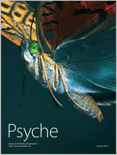
Psyche-A Journal of Entomology
Bridging Science and Conservation for InsectsPsyche-A Journal of Entomology is a distinguished open-access journal published by Hindawi Ltd, specializing in the field of entomology, including aspects of ecology, evolution, behavior, and systematics of insects. Established in 1874, this journal has a rich history of contributing to the scientific community by disseminating high-quality research related to insects and their diverse interactions within ecosystems. With an impact factor placing it in Q3 for both Ecology, Evolution, Behavior and Systematics and Insect Science, Psyche serves as a pivotal platform for researchers, professionals, and students aiming to deepen their understanding of insect-related science. The journal's commitment to open access ensures that research is accessible to a global audience, promoting collaboration and innovation in entomological studies. Covering a broad timeline of converged years from 1874 to 2024, Psyche fosters a comprehensive dialogue around insect biodiversity, conservation, and the ever-evolving dynamics of ecosystems in which insects play crucial roles.
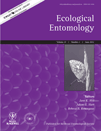
ECOLOGICAL ENTOMOLOGY
Advancing Knowledge at the Insect-Environment NexusECOLOGICAL ENTOMOLOGY is a leading peer-reviewed journal published by Wiley, focusing on the dynamic interplay between insects and their environments. With an ISSN of 0307-6946 and an E-ISSN of 1365-2311, this journal has been a pivotal resource in the fields of ecology and insect science since its inception in 1976, and is set to continue until 2024. Recognized for its high academic standards, the journal maintains a prestigious Q1 ranking in both the Ecology and Insect Science categories for 2023, and ranks in the 84th percentile among its peers in agricultural and biological sciences. Although not an Open Access journal, it provides vital insights into ecological processes and insect interactions, making it an essential read for researchers, professionals, and students committed to understanding and conserving biodiversity. The contributions published within its pages significantly advance the knowledge of ecological systems and inform practical approaches to environmental management.
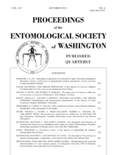
PROCEEDINGS OF THE ENTOMOLOGICAL SOCIETY OF WASHINGTON
Cultivating Scientific Discourse in EntomologyProceedings of the Entomological Society of Washington is a distinguished journal dedicated to the field of entomology, published by the Entomological Society of Washington. With a rich history dating back to 1981 and a commitment to fostering scientific discourse, this journal serves as a vital platform for researchers and professionals specializing in insect science and ecology. It holds a respectable<> impact factor and is categorized in the Q3 quartile in both Ecology, Evolution, Behavior and Systematics and Insect Science, indicating its relevance within the scientific community. Although it does not offer open access, it provides a curated selection of high-quality research articles that significantly contribute to the understanding of insect biology, behavior, and taxonomy. The journal aims to bridge gaps in current research and inspire innovations in entomological studies, making it an essential resource for students, researchers, and practitioners in the field.
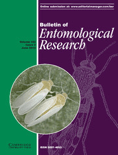
BULLETIN OF ENTOMOLOGICAL RESEARCH
Empowering Researchers with Cutting-edge Entomological InsightsBULLETIN OF ENTOMOLOGICAL RESEARCH, published by Cambridge University Press, is a prestigious journal that has been at the forefront of entomological research since its inception in 1910. With an impressive track record extending through to 2024, this journal serves as a vital platform for advancing knowledge in various related fields, notably Agronomy and Crop Science and Insect Science, where it ranks in the top quartile (Q2) and maintains a commendable position within the Scopus rankings in its categories. Notably, its contributions also intersect with Medicine in a broader scope, fostering interdisciplinary insights. While access to the journal content is not classified as 'Open Access,' its rigorous peer-reviewed articles are crucial for researchers, professionals, and students seeking to enhance their understanding of entomology and its applications in agronomy and beyond. The journal's impact is reflected in its notable percentile rankings, emphasizing its relevance and influence in the academic community. Located at the heart of the UK, the BULLETIN OF ENTOMOLOGICAL RESEARCH continues to be an essential resource for those dedicated to the study and understanding of insects and their impacts on agriculture and health.

Insects
Advancing the Frontiers of Entomological ResearchInsects is a prominent open-access journal published by MDPI, dedicated to advancing research in the vibrant field of insect science. Since its inception in 2011, this journal has become a vital resource for academics and professionals alike, also ranked in the prestigious Q1 category within the Insect Science field by Scopus, achieving a remarkable rank of 26 out of 181 journals. With an ongoing convergence period from 2010 to 2024, Insects provides comprehensive coverage of various aspects of entomology, including but not limited to ecology, behavior, physiology, and applied entomology. Based in Switzerland, the journal promotes an open-access model, ensuring that vital research is readily available to researchers, practitioners, and students globally. This journal not only facilitates the dissemination of groundbreaking entomological research but also fosters collaboration and interdisciplinary dialogue in the field.
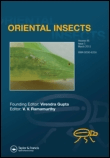
ORIENTAL INSECTS
Illuminating the Wonders of Oriental InsectsORIENTAL INSECTS is a distinguished journal dedicated to advancing the field of Insect Science, published by the reputable Taylor & Francis Ltd. With its long-standing history since 1967, this journal provides a platform for innovative research focused specifically on the diverse insect fauna of the Oriental region, encompassing topics such as taxonomy, ecology, physiology, and behavior. The journal is indexed with an ISSN of 0030-5316 and an E-ISSN of 2157-8745, making it easily accessible to a global audience. Although it currently does not operate under an Open Access model, its rigorous peer-review process ensures the dissemination of high-quality research. As a Q4 journal in the Insect Science category for 2023 and ranked 103 out of 181 in Scopus, ORIENTAL INSECTS remains a vital resource for researchers, professionals, and students seeking to enhance their understanding of insect biodiversity and conservation. Located in the United Kingdom, it is committed to promoting the latest scientific findings and fostering collaboration among entomologists worldwide, contributing significantly to the academic community.
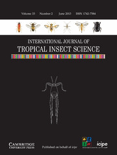
INTERNATIONAL JOURNAL OF TROPICAL INSECT SCIENCE
Uncovering the Secrets of Tropical Insect LifeINTERNATIONAL JOURNAL OF TROPICAL INSECT SCIENCE, published by Springer International Publishing AG, is a leading interdisciplinary journal dedicated to advancing knowledge in the fields of insect science and ecology. With its ISSN 1742-7584 and E-ISSN 1742-7592, this journal provides a platform for researchers to publish high-quality, peer-reviewed articles that explore various aspects of tropical insect biology, behavior, and their ecological impacts. As evidenced by its Q3 ranking in both Ecology, Evolution, Behavior and Systematics and Insect Science, it plays a vital role in fostering scientific dialogue and innovation within these disciplines. Researchers affiliated with the journal benefit from its visibility and growing impact, as demonstrated by its Scopus ranks, with a percentile standing of 61st in Insect Science. Although the journal is not open access, it still reaches a wide academic audience, making significant contributions to our understanding of tropical ecosystems. Situated in Switzerland, this journal is crucial for students, professionals, and researchers invested in the intersection of entomology and ecological science.

CANADIAN ENTOMOLOGIST
Unraveling the Mysteries of the Insect WorldCanadian Entomologist, published by Cambridge University Press, is a prominent journal dedicated to the field of entomology, covering key areas such as insect science, ecology, and evolutionary biology. With its origins dating back to 1868, this esteemed journal has continuously contributed to the understanding of insect behavior, systematics, and physiology, engaging researchers and professionals alike. Although currently not an Open Access journal, it offers valuable insights through its rigorously peer-reviewed articles, reflecting its commitment to scientific excellence. The journal has garnered a respectable Q3 ranking in various categories, including Ecology, Evolution, Behavior, and Systematics, making it a critical resource for scholars and students who seek to explore the complex interactions within insect populations and their environments. Researchers can trust Canadian Entomologist to provide relevant and impactful research that shapes contemporary understanding in the realm of entomological studies, fostering the growth of this vital scientific discipline.